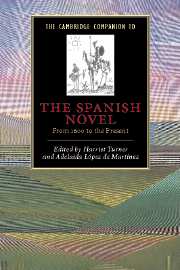3 - The Enlightenment and fictional form
from Part 1 - Since Cervantes
Published online by Cambridge University Press: 28 May 2006
Summary
Critical tradition holds that in Spain, the eighteenth century is one “without novels”in the sense of those produced by realist and naturalist authors; eighteenth-century novels have been characterized as didactic works lacking the stylistic interest and psychological depth of later narrative achievements, or as simply scarce presences in a century which in Europe saw the flourishing of the form. Yet recent scholarship has developed a more nuanced picture of the novel during the eighteenth century in Spain, a century that may no longer be accused of dearth in terms of either production or quality. In scores of original and translated or adapted works, eighteenth-century novelists gave readers access to “what was 'asked' of literature: observation of people, a realistic description of their lives, and a knowledge of their souls based on experience and their relation to society.”
Enlightenment fiction was the vehicle not only for moral instruction andlessons concerning virtue, but also for the observation of life and reality.Readers wanted fiction to represent experience as though it were happeningbefore their eyes, and turned to novels for realist elements such as theportrayal of consciousness and the depiction of intense emotions, a key componentof the most characteristic of Enlightenment fictional genres: the narrativeof sensibility. Authors of fiction experimented with the possibilities ofthe form in many aspects, such as dialogical modalities and the narration ofhuman experience in time.
- Type
- Chapter
- Information
- The Cambridge Companion to the Spanish NovelFrom 1600 to the Present, pp. 31 - 46Publisher: Cambridge University PressPrint publication year: 2003



